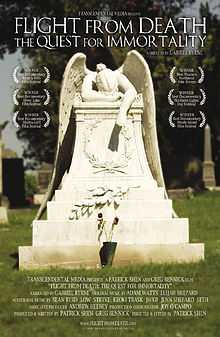Flight from Death
| Flight from Death | |
|---|---|
 Theatrical poster for Flight from Death | |
| Directed by | Patrick Shen |
| Produced by |
Patrick Shen Greg Bennick |
| Written by |
Greg Bennick Patrick Shen |
| Language | English |
| Release date |
|
| Running time | 89 min. |
Flight from Death (2003) is a documentary film that investigates the relationship of human violence to fear of death, as related to subconscious influences. The film describes death anxiety as a possible root cause of many human behaviors on a psychological, spiritual, and cultural level. It was directed by Patrick Shen and produced by Greg Bennick. The film's narration was done by Gabriel Byrne. Flight from Death is a seven-time Best Documentary award-winning film.
Summary
The film's purpose is to investigate humankind's relationship with death, and is heavily influenced by the views of cultural anthropologist Ernest Becker. In addition to interviews with a number of contemporary philosophers, psychiatrists and teachers such as Sam Keen, Robert Jay Lifton, Irvin Yalom, Merlyn Mowrey and Daniel Liechty, the film introduces the viewer to a group of social psychologists, who conduct research in support of what they call Terror management theory (terror in this case not being terrorism, but rather emotional and psychological reaction to mortality awareness). Over the last twenty-five years, proponents of terror management theory have conducted over 300 laboratory studies demonstrating that subtle reminders of death on a subconscious level motivates a statistically significant number of subjects to exhibit biased and xenophobic type behaviors, such as gravitating toward those who they perceive as culturally similar to themselves and holding higher negative feelings and judgments toward those they perceive as culturally dissimilar to themselves.
Studies and research
In a recent study, the research team discovered that reminding Palestinians of their own death through subconscious means inspired conscious shifts in opinion towards wanting to become suicide bombers.[citation needed] This subconscious death reminder inspired the subjects to act aggressively against differing others, even at the risk of losing their own lives. Terror is the result of deep psychological forces;[1] the research described in Flight from Death suggests that these forces can be explained, yielding information about personal anxiety and the motivation of social violence.
Recognition and awards
- Beverly Hills Film Festival - Audience Choice Award for Best Documentary (2003)[2]
- Ohio Independent Film Festival - Best Documentary (2003)[3]
- Silver Lake Film Festival - Best Documentary (2003)[4]
- Malibu Film Festival - Best Documentary (2004)[5]
- Northern Lights Documentary Film Festival - Best Documentary (2004)
- Northwest Film Forum - Best Documentary (2004)[6]
- Rhode Island International Film Festival - Best Documentary (2004)[7]
References
- ↑ Hudson, Rex A (1999), The Sociology and Psychology of Terrorism: Who Becomes A Terrorist and Why?, Federal Research Division, Library of Congress, p. 10
- ↑ Beverly Hills Film Festival, 2003 Award Winners ( – Scholar search), archived from the original on November 9, 2006, retrieved 2007-10-06
- ↑ Independent Pictures, Festival's Award-winning Films Announced, retrieved 2007-10-06
- ↑ The New York Times Company, Flight From Death: The Quest for Immortality (2003), retrieved 2007-10-06
- ↑ The Film Connection, Flight from Death: The Quest for Immortality, retrieved 2007-10-06
- ↑ Northwest Film Forum, NWFF's 10th Annual Local Sightings October 4-11 ( – Scholar search), retrieved 2007-10-06
- ↑ Rhode Island International Film Festival, 2004 RIIFF Film Award Winners, retrieved 2007-10-06
See also
External links
- Official website
- Flight from Death: The Quest for Immortality at the Internet Movie Database
- Watch Flight From Death on Hulu